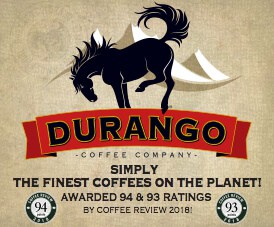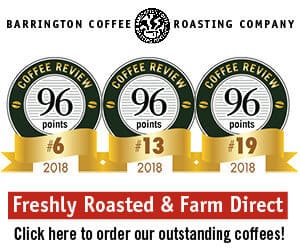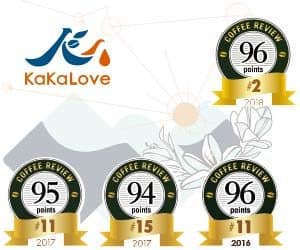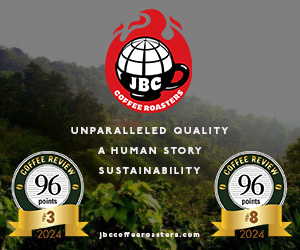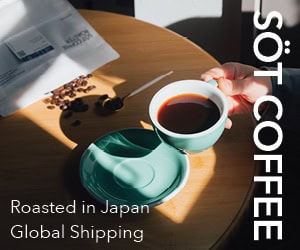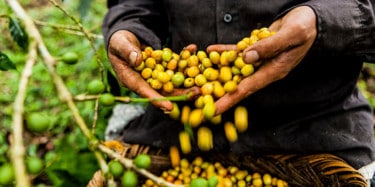This coffee tied for the third-highest rating in a cupping of Value Coffees for Coffee Review‘s March 2018 tasting report. Produced on Finca Libre farm by Pil Hoon Seu from trees of the respected Catuai variety of Arabica. Processed by the wet or washed method (fruit skin and pulp are removed before drying). Crescendo Coffee Roasters, founded in 2015, provides customers with well-balanced blends
SEARCH RESULTS
Finca San Luis Colombia Espresso
Produced by Omar Arango in the Tolima Department of Colombia from trees of the respected Caturra and Catuai varieties of Arabica. This is a wet-processed or “washed” coffee, meaning the fruit skin and pulp were removed from the beans immediately after harvesting and before drying. Chocolate Fish is a distinguished New-Zealand-inspired micro-roaster based in Sacramento California, focused on the
El Peñon Nicaragua
Produced by Markus Fisher at Finca La Bastilla entirely from trees of the respected Red Catuai variety of Arabica. Processed by the wet or “washed” method, in which skin and fruit flesh are removed from the beans or seeds before they are dried. Barrington Coffee is an artisan roaster dedicated to elite coffees, fresh delivery and roasting that foregrounds the coffee and not the roast. Visit
Honduras Los Catadores Honey
Honduras, until recently a largely overlooked Central American coffee origin, has been producing increasing volumes of fine coffee over the past decade. Produced entirely from trees of the Catuai variety of Arabica and processed by the honey method, which means that the outer skin of the coffee fruit is removed as it is in the wet or “washed” process, but at least some of the sticky fruit residue
Panama Elida Green Tip Gesha Natural
This coffee tied for the third-highest rating in a tasting of holiday coffees for Coffee Review‘s December 2017 tasting report. Produced entirely from trees of the respected Catuai variety of Arabica. The Lamastus family’s Elida Estate averages the highest growing elevations in Panama: 5,500 to 8,200 feet (1,700 to 2,500 meters). This is a “natural” or dry-processed coffee, meaning the beans were
Panama Finca San Sebastian
Produced at Finca San Sebastian from trees of the Catuai and Typica varieties of Arabica. Processed by the wet or washed method (fruit skin and pulp are removed before drying). Jackrabbit Java selects the finest coffees from around the world and roasts them in Thermopolis, Wyoming’s fresh mountain air. All Jackrabbit Java coffees are specialty-grade and roasted to order. Visit
Organic Shade-Grown Nicaragua
This coffee tied for the third-highest rating in a tasting of 55 Nicaragua coffees for Coffee Review‘s October 2017 tasting report. Produced at Finca Los Pinos by the Corrales family from trees of the Maracaturra, Caturra and Catuai varieties of Arabica. Processed by the wet or washed method (fruit skin and pulp are removed from the beans before drying). This coffee is certified Bird Friendly by
Santa Maria Natural Yellow Catuai
This coffee tied for the second-highest rating in a tasting of 55 Nicaragua coffees for Coffee Review‘s October 2017 tasting report. Produced by Victor Manuel Robelo Rodriguez entirely from trees of the Yellow Catuai variety of Arabica processed by the dry or "natural" method, meaning the beans were dried inside the fruit rather than after the fruit has been removed, as is the case with
The New Nicaragua: Direct Trade Coffees Rule
When we first reported on coffees from Nicaragua, in 2004, the overarching theme was economic development. Specialty coffee was viewed as a way of opening access to economic and social benefits for Nicaragua’s many small- to medium-holding coffee farmers, most of whom had been decimated by the global drop in coffee prices during 1999-2003, and prior to that, by the long war that isolated the
Guaya’b Guatemala
Produced by the Guaya’b Cooperative from trees of the Typica, Bourbon, Caturra and Catuai varieties of Arabica. This is a wet-processed or “washed” coffee, meaning the fruit skin and pulp were removed from the beans immediately after harvesting and before drying. JBC Coffee Roasters’ vision is simple: “let the coffee lead the way” through sourcing and roasting the best and most unique coffees
Static Hacienda Sonora Costa Rica
Produced from trees of the Caturra and Catuai varieties of Arabica by farmers Alberto and Diego Guardia of Sonora Estate in Costa Rica. Processed by the honey method (sometimes referred to as “semi-washed”), which means that the outer skin of the coffee fruit is removed as it is in the wet or “washed” process, but at least some of the sticky fruit residue is allowed to dry on the bean and later
Static Don Eli La Pastora Tarrazu Costa Rica
Produced by Don Eli of the Caturra and Catuai varieties of Arabica. Processed by the white honey method. With all honey processing methods, some sweet pulp or fruit flesh (“honey”) is allowed to adhere to the beans during drying. In the white honey variation, an extremely thin layer of pulp is allowed to dry on the beans, less than with yellow honey, and much less than is the case with red or
Honduras Finca Jerusalen
Produced by Dionisio Cruz Mendoza at Finca Jerusalen entirely of the Red Catuai variety of Arabica. Processed by the wet or washed method (fruit skin and pulp are removed before drying). Branch Street Coffee Roasters is a small-batch specialty coffee roaster in Youngstown, Ohio. Under the careful eye of owner/roaster Matthew Campbell, each coffee is individually profiled and cupped to ensure peak
Brazil Paulo Ribeiro Rocha
Produced by Paulo Ribeiro Rocha Revel from trees of the Acaia, Catuai and Bourbon varieties of Arabica. This is a dry-processed or “natural” coffee, meaning the beans were dried inside the fruit rather than after the fruit has been removed, as is the case with wet-processed or “washed” coffees. Revel Coffee is a micro-roaster located in Billings, Montana. Its motto: “Quality is paramount — a
Costa Rica La Cereza Roja Semi-Washed
Produced from trees of the Caturra and Catuai varieties of Arabica. Processed by the honey method (sometimes referred to as “semi-washed”), which means that the outer skin of the coffee fruit is removed as it is in the wet or “washed” process, but at least some of the sticky fruit residue is allowed to dry on the bean and later removed by machine along with the parchment skin. Founded in 2004,
Puna Natural
Produced from trees of the Red Caturra, Red Catuai, Pache and Bourbon varieties of Arabica. This is a dry-processed or “natural” coffee, meaning the beans were dried inside the fruit rather than after the fruit has been removed, as is the case with wet-processed or “washed” coffees.This coffee tied for the second-highest rating in a tasting of women-produced coffees for Coffee Review‘s June 2017
Barrel-Aged Coffee
Produced on the high-elevation El Cipres farm by farmers Yader and Karen from trees of the Caturra and Catuai varieties of Arabica. Conditioned before roasting in a barrel previously used to age Jamaican rum and, before that, Tennessee whiskey. This coffee tied for the third-highest rating in a cupping of aged, casked and specially cured coffees for Coffee Review‘s May 2017 tasting report. Reprise
Costa Rica Microlot White Honey
Produced by Helsar Magdalena of Santa Lucia Farm of the Caturra and Catuai varieties of Arabica. Processed by the white honey method. With all honey processing methods, some sweet pulp or fruit flesh (“honey”) is allowed to adhere to the beans during drying. In the white honey variation, an extremely thin layer of pulp is allowed to dry on the beans, less than with yellow honey, and much less than
Dharma Blend Espresso
A blend comprised of a wet-processed coffee from Brazil Terra Matas de Minas, a dried-in-the-fruit or “natural”-processed Ethiopia Sidamo and a honey-processed Costa Rica Sonora Estate Red Catuai. Temple Coffee is a quality-focused retail and wholesale specialty roaster active in Sacramento, California since 2005. Committed to sourcing, roasting and brewing the finest coffees, Temple features
Costa Rica Sonoran Estate Red Catuai
Produced exclusively from trees of the respected Red Catuai variety of Arabica by farmers Alberto and Diego Guardia of Sonora Estate in Costa Rica. This coffee was processed by the honey method, which means that the outer skin is removed as it is in the wet or “washed” process, but at least some of the sticky fruit residue is allowed to dry on the bean and later removed by machine along with the


